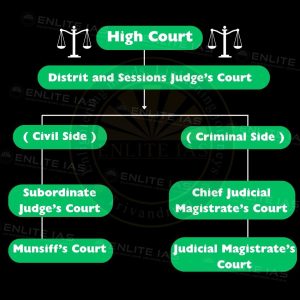Constitutional Provisions
- Articles 233 to 237 in Part VI of the Constitution deals provisions to regulate the organization of subordinate courts and to ensure their independence from the executive.
District Judges
- Qualification for Appointment
- He should not already be in the service of the Central or the state
- He should have been an advocate for seven years.
- He should be recommended by the HC for appointment.
- Appointment: Appointments of persons (other than district judges) to the judicial service of a state are made by the governor of the state after consultation with the State Public Service Commission and the high court.
- Powers
- The district judge is the highest judicial authority in the district. He possesses original and appellate jurisdiction in both civil as well as criminal matters. I
- When he deals with civil cases, he is known as the district judge and when he hears the criminal cases, he is called as the sessions judge.
- The district judge exercises both judicial and administrative powers. He also has supervisory powers over all the subordinate courts in the district. Appeals against his orders and judgements lie to the High Court.
- The sessions judge has the power to impose any sentence including life imprisonment and capital punishment (death sentence). However, a capital punishment passed by him is subject to confirmation by the High Court,
Structure and Jurisdiction

- Court stands the Court of Subordinate Judge on the civil side and the Court of Chief Judicial Magistrate on the criminal side.
- The subordinate judge exercises unlimited pecuniary jurisdiction over civil suits .
- The chief judicial magistrate decides criminal cases which are punishable with imprisonment for a term up to seven years.
- At the lowest level, on the civil side, is the Court of Munsiff and on the criminal side, is the Court of Judicial Magistrate.
- The munsiff possesses limited jurisdiction and decides civil cases of small pecuniary stake.The judicial magistrate tries criminal cases which are punishable with imprisonment for a term up to three years.
Lok Adalats
- The term ‘Lok Adalat’ means ‘People’s Court’ and is based on Gandhian principles.
- It is one of the components of the Alternative Dispute Resolution (ADR) system and delivers informal, cheap and expeditious justice to the common people.
- The first Lok Adalat camp was organized in Gujarat in 1982
- it was given statutory status under the Legal Services Authorities Act, 1987. The Act makes the provisions relating to the organization and functioning of the Lok Adalats.
- National Legal Services Authority (NALSA) along with other Legal Services Institutions conducts Lok Adalats.
- The Legal Services Authorities Act, 1987 was amended in 2002 to provide for the establishment of the Permanent Lok Adalats to deal with cases pertaining to the public utility services.
- Matters such as matrimonial/family disputes, criminal (compoundable offenses) cases, land acquisition cases, labor disputes, workmen’s compensation cases, bank recovery cases, etc. are being taken up in Lok Adalats.
- The Lok Adalat shall have the same powers as are vested in a Civil Court under the Code of Civil Procedure (1908).
Gram Nyayalayas
- Formation
- The Law Commission of India, in its 114 Report, had suggested the establishment of Gram Nyayalayas for providing affordable and quick access to justice to the citizens at their doorsteps.
- Gram Nyayalayas or village courts are established under the Gram Nyayalayas Act, 2008 for speedy and easy access to the justice system in the rural areas of India.
- Composition
- The Gram Nyayalayas are presided over by a Nyayadhikari, who will have the same power, enjoy the same salary and benefits as a Judicial Magistrate of First Class.
- Appointment: By the State Government in consultation with the respective High Court.
- Jurisdiction: Over an area specified by a notification by the State Government in consultation with the respective High Court.
- The Court can function as a mobile court at any place within the jurisdiction of such Gram Nyayalaya, after giving wide publicity in that regard.
- They have both civil and criminal jurisdiction over the offences.
- The pecuniary jurisdiction of the Nyayalayas is fixed by the respective High Courts.
- Gram Nyayalayas has been given the power to accept certain evidence which would otherwise not be acceptable under the Indian Evidence Act.
- Procedure to be followed:
- Gram Nyayalayas can follow special procedures in civil matters, in a manner it deems just and reasonable in the interest of justice.
- Gram Nyayalayas allow for conciliation of the dispute and settlement of the same in the first instance.
- Appeals
- An appeal in criminal cases shall lie to the Court of Session, which shall be heard and disposed of within a period of six months from the date of filing of such appeal.
- An appeal in civil casesshall lie to the District Court, which shall be heard and disposed of within a period of six months from the date of filing of the appeal.
